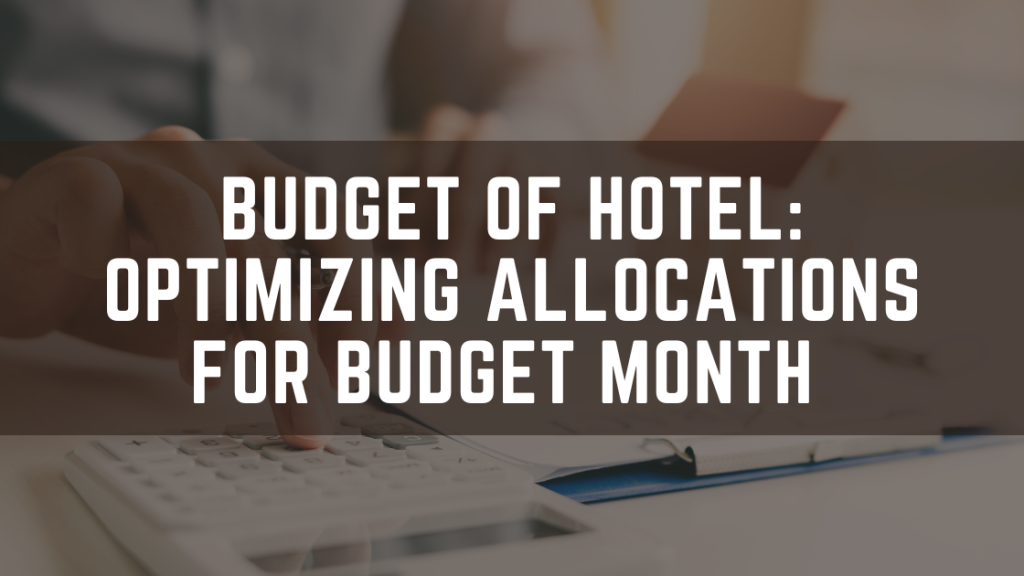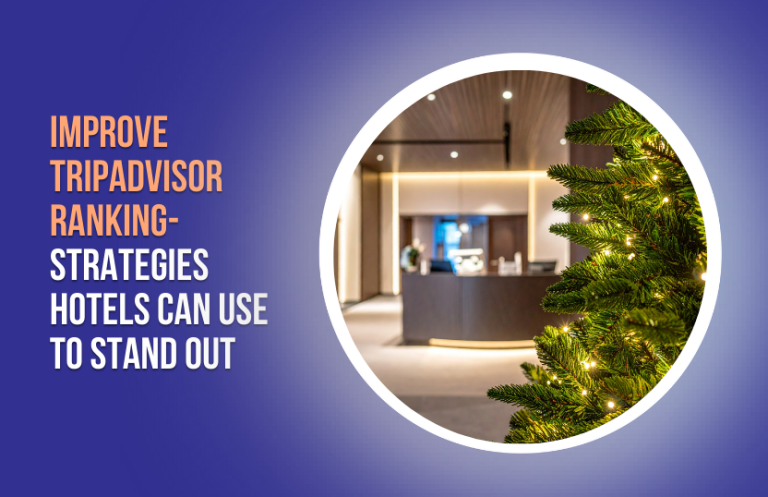Every year the budget of hotel is done between July and September budget season begins for many hotels that operate on a Calendar Budget Year. General Managers, Commercial Leaders, Directors of Sales, Directors of Revenue, and other team members start their annual budget process, which often runs for months, perhaps concluding with a presentation to owners or other stakeholders in November, December, and in some cases, we’ve even seen it be Q1 of the new year before a new budget gets full approval.
These budgeting months are a critical time for hotels, as they set the financial groundwork for the year ahead. Knowing where to allocate funds during this period can make all the difference in achieving your financial goals. In this guide for beginners to hotel budgeting, we’ll explore some key areas where you should focus your budget allocation during this season and explain why each one is essential for your hotel’s success.
Room Revenue Optimization
Room revenue is the most significant source of income for your hotel, and many hotels kick off budget season by planning how to maximize this revenue. Budgeting room revenues requires historical data and intel on what lies ahead for your hotel in the future, including your sales pipeline, and business already on-the-books. As the leadership team starts to build out expected sleeping room revenues, they are also budgeting daily occupancy rates, average room rates, and Revenue Per Available Room (RevPAR) throughout the year.
Key Allocations for Consideration:
- Revenue Management Software: During budget season, and throughout the year utilize the resources available in your advanced revenue management systems. These reports and forecasting tools provide great insight for setting competitive room rates based on data-driven forecasts.
- Online Distribution Channels: Ensure that your budget includes funds for visibility on multiple booking platforms. This helps increase your reach and occupancy rates.
- Website and SEO: Post-Pandemic, OTA volume has skyrocketed as a segment and hotels are once again doing all that they can to attract direct bookings. Budget for ongoing website improvements that make the reservation process as seamless as the OTA experience and ensure SEO efforts are in place that position your hotel to be discovered online.
Staff Salaries and Training
Your staff plays a crucial role in delivering excellent guest experiences, which in turn drives revenue. During budget month, it’s important to allocate funds to ensure competitive salaries and comprehensive training programs, which will help you attract and retain top talent.
Overheard at a Tradeshow in 2023: “If it’s going to be a challenge to find and attract great talent, we need to invest in those who we have in-house.”
Key Allocations for Consideration:
- Competitive Salaries: Conduct a market compensation study. Allocate funds to offer wages that attract qualified employees. Consider the introduction of incentive programs even for hourly associates. Ensuring you have a motivated team is essential for maintaining high service standards.
- Training Programs: Budget for regular staff training, especially in customer service and operational efficiency. Well-trained colleagues who feel valued and see that investments are being made in their futures enhance the overall guest experience, leading to better reviews and repeat business.
- Employee Benefits: Consider allocating money for employee benefits such as health insurance or elevated PTO programs, free parking, or other benefits. These can make you stand apart from the competition, improve job satisfaction, and reduce turnover, saving costs in the long run.
Maintenance and Repairs
Keeping your property in excellent condition is essential for guest satisfaction and operational efficiency. Budget season is the ideal time to plan for both routine preventative maintenance and unexpected repairs, as well as thoughts on Capital Expenditures for the next five-year term. Ensuring that your product is competitive in the marketplace better positions your team to drive the revenue growth that is likely being planned for the coming year.
Key Allocations for Consideration:
- Preventive Maintenance: Allocate funds for regular maintenance checks on HVAC systems, plumbing, and electrical systems. Preventive maintenance helps avoid costly repairs later.
- Emergency Repairs: Set aside a contingency fund for unexpected repairs. This ensures you can quickly address any issues without disrupting your operations or exceeding your budget.
- Renovations: Budget season is the time to plan for things like new in-room amenities and fixtures, perhaps a soft goods refresh, or a more in-depth case-goods renovation. Keeping your property modern and appealing is key to staying competitive in the market.
Marketing and Advertising
Effective marketing is crucial for driving bookings, especially in a competitive market. Budget month allows you to plan your marketing spend for the year, ensuring that you’re reaching potential guests through the right channels.
Key Allocations for Consideration:
- Digital Marketing: Allocate funds for digital marketing strategies such as search engine marketing (SEM), social media advertising, and email campaigns. These are cost-effective ways to reach a broad audience and drive bookings.
- Content Creation: Budget for professional photography, video production, and copywriting to create high-quality content that highlights your hotel’s unique offerings.
- Brand Partnerships: Consider partnerships with travel influencers or local businesses. These collaborations can enhance your marketing efforts and reach new audiences.
Food and Beverage (F&B) Operations
F&B operations can be a significant source of revenue for your hotel. Budget Season is the time to plan investments in this area to improve service quality and increase profitability.
Key Allocations for Consideration:
- Menu Development: Allocate funds for menu innovation and sourcing quality ingredients. Offering a unique and high-quality dining experience can set your hotel apart from competitors.
- F&B Technology: Invest in technology like point-of-sale (POS) systems to streamline operations and improve service efficiency. This can lead to better guest experiences and higher profitability.
- Staff Training: Budget for F&B staff training to ensure excellent service. Well-trained colleagues can upsell, manage orders efficiently, and create a welcoming atmosphere that encourages repeat business.
Technology and Innovation
Investing in the latest technology during budget season can improve operational efficiency and guest satisfaction. Allocating funds to technology ensures that your hotel stays competitive in a rapidly evolving industry.
Key Allocations for Consideration:
- Property Management System (PMS): You might be budgeting for a new, more robust PMS that helps manage bookings, guest information and preferences, and room availability efficiently.
- Guest Experience Technology: It might also be time to allocate funds for upgrades on in-room technology like smart TVs, AI and voice command features, mobile check-in/check-out systems, and high-speed internet. These features are increasingly expected by guests and can enhance their stay.
- Data Security: With the increasing importance of protecting guest information, every budget season should include an assessment of cybersecurity measures and the identification of any upgrades that need to occur to best safeguard your hotel’s data and that of your guests.
Sustainability Initiatives
Sustainability is a growing concern for travelers. In planning your budget for next year, you might find that now is the time to allocate funds to green initiatives, which not only help the environment but also attract eco-conscious guests and enhance your hotel’s reputation.
Key Allocations for Consideration:
- Energy Efficiency: Invest in energy-efficient lighting, heating, and cooling systems. These upgrades can reduce your hotel’s carbon footprint and lower utility costs.
- Waste Reduction: Allocate funds to implement recycling programs and reduce single-use plastics. These initiatives can save money and improve your hotel’s image.
- Green Certifications: Consider budgeting for certifications like LEED or Green Key. These credentials can enhance your hotel’s reputation as a sustainable business.
Guest Experience Enhancements
The guest experience is the core of your hotel’s success. Allocating funds during budget month to enhance the guest experience can lead to positive reviews, repeat business, and increased revenue.
Key Allocations for Consideration:
- In-Room Amenities: Upgrade in-room amenities like bedding, toiletries, and entertainment options. These enhancements create a more comfortable and enjoyable stay for guests and provide a competitive advantage.
- Service Excellence: Invest in personalized services, such as concierge or guest relations, to exceed guest expectations and create memorable experiences.
- Loyalty Programs: Allocate funds to develop or improve your loyalty program, encouraging repeat visits and increasing customer retention.
Budget of Hotel – Conclusion
During budget season, it’s crucial to carefully plan where to allocate your funds to ensure your hotel’s financial success. By focusing on these key areas—room revenue optimization, staff salaries and training, maintenance and repairs, marketing, F&B operations, technology, sustainability, and guest experience enhancements—you can create a budget that supports your hotel’s goals and keeps your business competitive in the hospitality industry. With strategic budget planning, your hotel can navigate the challenges of the year ahead and achieve its financial objectives.
At The Reputation Lab, we work with hotels and restaurants to facilitate a reputation management strategy aimed at increasing online visibility, engaging your customers, and converting more shoppers to future guests and revenue producers. If you are interested in learning how a reputation management strategy can benefit your business, we invite you to email us via our secure contact form to set up a no-pressure consultation or call us at 855-979-6800




